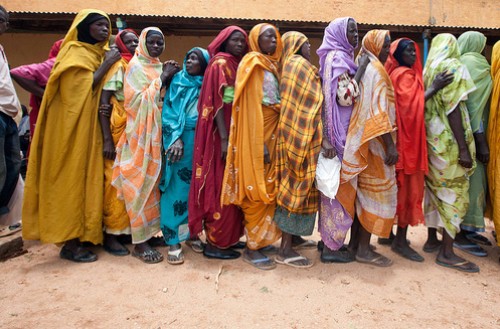Image: Women in North Darfur queue to be examined by doctors, 2012 (Photo: UNAMID).
Research in Africa has consistently found that the poor are more likely than the better off to pay bribes to state officials for public services. This matters for all sorts of reasons, but from a state-building and developmental perspective, the crisis of trust that corruption can trigger can be devastating. When services are pushed just that bit further away by public-servants-turned-corrupt-gatekeepers, it is likely to colour the already jaundiced perceptions that hard-pressed communities may have of state institutions and of their legitimacy; and also, as Seligson puts it, of ‘the broader national governance frameworks in which they are located’.
So why are Africa’s poor more vulnerable to bribery for publicly provided services than those who are wealthier, who could afford to pay larger bribes? Scholars have so far argued that the poor are seen as ‘easy targets’ by bribe-seeking bureaucrats: the poor have less power, fewer influential connections and less knowledge about what they are entitled to, making them less likely to resist or report requests for bribes.
But there is another possible explanation: the poor simply use state services more than those who can afford privately provided services, and therefore come into contact with corrupt state officials more often.
In a new study, Richard Rose and I test which of these explanations is more accurate. We analyse Afrobarometer survey responses from 51,605 people across 34 African countries (2011-2013).
First we explore whether Africa’s poor are more likely than the better off to pay a bribe even for services that only the state provides. When non-state providers also offer a service – such as healthcare or education, for instance – people with enough money can choose the provider they prefer. But for some services everyone must interact with the state, irrespective of personal circumstances – when they need official documents and permits or police services, for example.
We find that while the poor are more likely than the wealthier to pay a bribe for state services that other providers also offer (‘choice’ services), they are not more or less likely to do so for ‘monopoly’ state services. This suggests that in Africa frequency of contact with state providers may be more important than people’s socioeconomic status in determining their vulnerability to bribery for state services.
This is confirmed when we take a closer look at why the poor are more likely to be ‘choice service’ bribe payers. We find that, once the impact of poverty on an individual’s likelihood of using state services is taken into account, poverty has no independent impact on bribery.
So if Africa’s poor are more likely than the better off to pay a bribe for state-provided ‘choice services’ because they are more likely to use them, what policy implications might this have?
Expanding choice through privatisation has been a common policy response to bribery and inefficiency in public services: profit-making institutions are thought to be both more efficient and more effective in reducing employee bribe-taking. Our study does not look at the existence or extent of bribery in privately provided services. But it highlights that a genuine choice of provider depends on access: the potential of non-state services to benefit the poor depends on how easily the poor can access them.
State-provided vouchers are one means that could enable more poor people to access private services. But voucher schemes could of course involve some risks. If vouchers did not fully meet the charges and higher numbers of better off people used private services, inequality could increase: policymakers would need to ensure that the poor did not become even more disproportionately vulnerable to corruption in public services.
Read more about the study’s findings and see coverage in The Washington Post.









